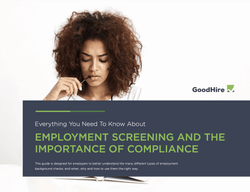Pros & Cons To Checking Candidates’ Credit In The Interview Process
We’re sharing the pros and cons, as well as important considerations about using credit checks, so you can make the best decision for your company.
Resourcesarticles
Ashley Blonquist
8 min read
Employment credit checks are a necessary part of background screening for jobs managing or handling money. But employers conducting these credit checks must comply with the Fair Credit Reporting Act (FCRA) as well as state and local laws.
Learn how hiring a compliant consumer reporting agency (CRA) to conduct credit checks can mitigate risk for your company.
Credit checks are a necessary part of the screening process for specific jobs and fields. Positions that typically require a credit background check include roles where employees are responsible for managing finances or handling large amounts of money; have access to trade secrets; or work in certain industries like financial services.
But conducting credit background checks (or any other type of background check) requires careful compliance with a federal law called the Fair Credit Reporting Act, also known as the FCRA. And employment screening companies like GoodHire require companies to undergo additional credentialing in order to qualify for employment credit checks.
GoodHire is sharing what employers need to know about the FCRA and credit checks, and why hiring a compliant consumer reporting agency (CRA) to conduct credit checks is a wise investment for your company.
The FCRA went into effect in 1970. It’s a federal law initially passed to protect consumers’ personal financial information on their credit reports. Because of its broad language, the FCRA covers both traditional credit bureaus and CRAs like GoodHire that conduct background checks for employers. Both CRAs and employers have important responsibilities to meet FCRA requirements.
The ultimate intention of the FCRA is to protect consumers by giving them the right to:
Before employers can run credit checks, the company must be credentialed first. Credentialing is the verification process that provides documentation to the CRA showing that your business is legitimate and eligible to receive credit report information.
While CRAs may require different information from your business, the process only needs to be completed once and typically takes between three to five days. You’ll need to submit an application and provide documentation, and an on-site inspection of your primary place of business may be required.
Your company may be exempt from the onsite inspection if it is:
Employers also need to be aware of local state and city laws that may apply to employment credit checks. Currently, 10 states have passed laws which prohibit certain employers from running credit reports at all, or limit how and when they may be used to make hiring or other employment decisions.
If you use GoodHire, we’ll help you navigate the web of federal and local hiring laws during the screening process, but you’ll want to consult with your legal counsel to make sure you qualify to purchase and use employment credit credit checks due to the complex nature of laws that limit the use of credit history in employment decisions.
Once credentialed, employers must remain compliant with the following requirements:

Unfortunately, FCRA violations are common—and fines can be costly and lawsuits can damage a company’s reputation and brand. One study revealed a 100% increase in lawsuits filed under the FCRA from 2009 to 2018—many of which were class-action lawsuits.
To put that into context, just one FCRA violation can result in $100 to $1,000 in statutory damages, and when companies screen hundreds or thousands of candidates, one class-action lawsuit could pose a potential for hundreds of thousands of dollars or more in damages, not to mention the cost of attorneys’ fees.
One of the best ways to avoid FCRA violations and ensure fair hiring practices? Hire an FCRA-compliant employment screening provider like GoodHire.
Whether we’re helping employers become credentialed, running thorough and accurate credit checks, or guiding you through post-screening next steps, we help you maintain compliance every step of the way.
GoodHire provides simply better employment screening for you and your candidates. Learn more about credit checks and get started today.
Get peace of mind with built-in compliance features.
talk to SalesThe resources provided here are for educational purposes only and do not constitute legal advice. We advise you to consult your own counsel if you have legal questions related to your specific practices and compliance with applicable laws.
We’re sharing the pros and cons, as well as important considerations about using credit checks, so you can make the best decision for your company.
Many consumers place a freeze on their credit for added security. Find out what a credit freeze is, and whether a credit freeze can affect background checks.
Learn more about what to consider and how to approach rescinding a job offer based on the results of a credit background check, and the proper steps to take.